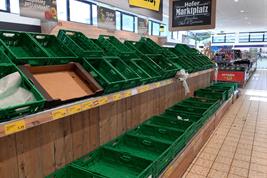07.04.2022
Press Release

Russia's war of aggression on Ukraine has triggered a humanitarian crisis. Beyond the acts of war and the suffering of the people on the ground, there is a threat of crop failures in Ukraine. Export restrictions imposed by Russia will also drive up world market prices for numerous agricultural products. Both countries are among the most important exporters of wheat and sunflower oil. In countries that are already dependent on food imports or aid supplies, a further price increase could have catastrophic consequences and drastically exacerbate the problem of hunger and malnutrition.
It is therefore essential that the European Union responds to the looming global food crisis with proposals for the European agricultural and food sector. The current discourse of the European Union to suspend already agreed measures for environmental and climate protection in favor of production increases is questionable in view of the necessary climate and biodiversity protection goals. After all, climate change and the loss of biodiversity are crises that already pose a massive threat to the food security of millions of people and will continue to do so in the medium term.
Several scientific and civil society organizations have already expressed their concern about the negative consequences of withdrawing the agreed environmental protection measures. ZALF strongly agrees with this assessment. These include, in particular, the planned reuse of ecological set-aside areas as well as a delay or halt to a European renaturation law and a delay in the reduction targets set out in the "Farm2Fork" strategy, for example in plant protection.
At the same time, ZALF supports alternative measures instead. These include:
- the provision of further financial resources for the United Nations World Food Program;
- moving away from the use of agricultural land for fuel production;
- the diversification of farming systems to reduce the application of synthetic chemical pesticides;
- the reduction of meat consumption;
- the reduction of livestock for a climate-friendly agricultural and food system;
- further expansion of a bioeconomy based on renewable raw materials to substitute fossil-based means of production and products, especially in the manufacturing and pharmaceutical sectors. The land required for this is comparatively small. This means that there is no competition with food production.
ZALF is expressly committed to a rapid transformation of agricultural and food systems, which is necessary from a scientific point of view and which includes nature-based and technological innovations in production as well as changes in dietary habits and an improved circular economy. There is no more time for postponing this transformation with the intention of increasing production.
 Press Release as PDF
Press Release as PDF
